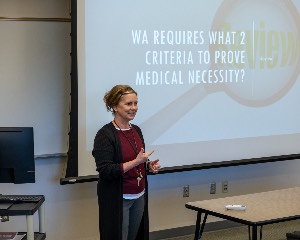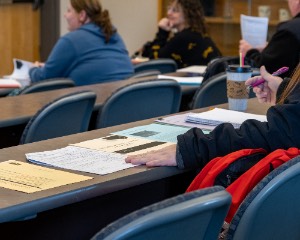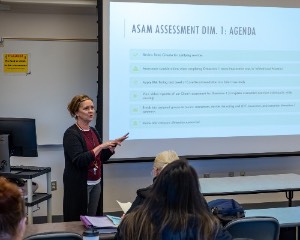Substance Use Disorder Professional
The Substance Use Disorder Program is for those seeking a rewarding career counseling and guiding individuals with substance use disorders (SUDs) throughout their recovery journey.



Students gain the knowledge, skills, and attitudes needed to counsel individuals with SUDs throughout the continuum of care. Students who complete the degree and an internship fulfill Washington Administrative Code requirements toward a Substance Use Disorder Professional (SUDP) certification.
Areas of instruction include:
- Client screening and evaluation
- Treatment planning and implementation
- SUD counseling practices and skills
- Professional and ethical responsibilities
Download the Crosswalk (pdf): The crosswalk outlines the Substance Use Disorder Professional program course numbers related to Washington State SUDP educational requirements (WAC 246-811-030).
- Begin the Substance Use Disorder Professional degree program at Centralia College.
- Become a certified Substance Use Disorder Professional Trainee (SUDPT) by completing the SUDPT Application with the Washington Department of Health.
- Begin your internship (a minimum of 2,500 hours of experience is required; hours can be accumulated during your education).
- Pass a certification test.
When all of the above steps are completed, students are eligible to apply for credentials from Washington State as a Substance Use Disorder Professional (SUDP).
Washington State is currently experiencing a shortage of Substance Use Disorder Professionals (SUDPs). Certified SUDPs work in many different treatment settings:
- Residential and Outpatient Facilities
- Schools
- Probation Offices
- Corrections Departments
- Mental Health Agencies
- Prevention Programs
Upon successful completion, students will have demonstrated the ability to:
- Demonstrate an understanding of developmental psychology and psychopathology.
- Evaluate, assess, and treat addiction, substance abuse and chemical dependency in adolescents and adults.
- Recognize the pharmacological actions of alcohol and other drugs.
- Apply chemical dependency rules and regulations as well as professional and ethical responsibilities to patient care.
- Coordinate the use of services, referrals, and community resources.
- Recognize cultural diversity, including people with disabilities, and its implications for treatment.
- Plan and implement appropriate addiction placement, continuing care, and discharge criteria.
- Plan and provide effective counseling for chemical dependency, relapse prevention and continuing care for addicted individuals, their families or significant others in individual or group sessions.
- Demonstrate skills necessary to perform clinical evaluations, HIV/AIDS risk interventions and case management functions.
Degree: Associate in Applied Science
Total Credits: 93
| First Year | |
| Fall Quarter |
|
| Winter Quarter |
|
| Spring Quarter |
|
* SUDP 100 is a prerequisite for all other CDP classes. A GPA of 2.0 or higher is required in all CDP courses. ** Quantitative Skills Recommended: MATH& 107 or MATH& 146
| Second Year | |
| Fall Quarter |
|
| Winter Quarter |
|
| Spring Quarter |
|
Note: Students interested in pursuing a bachelor's degree should seek the guidance of an advisor.
Contact
Shyla Rabe, MS, SUDP
SUDP Instructor
Healthcare and Industrial Trades
Office: TAC 310
360-623-8695
Email Shyla Rabe
